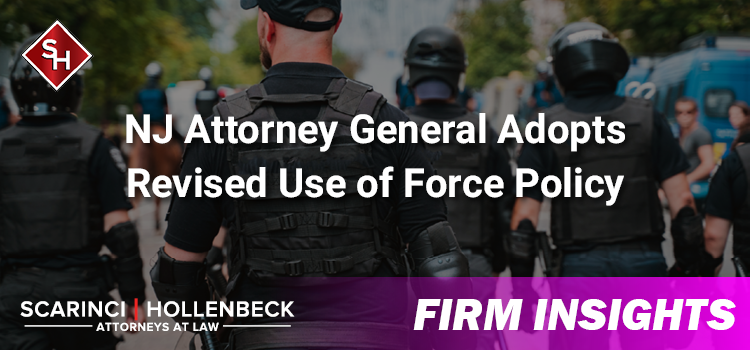
Last month, New Jersey Attorney General Gurbir S. Grewal announced significant changes to the statewide “Attorney General Directive Establishing the Use of Force Policy and Procedures” (Use of Force Policy) that must be followed by all state, county, and local law enforcement officers in New Jersey. This is the first time that the Use of Force Policy has been updated since 2000.
“We are committed to making New Jersey a national leader in policing reform, and today’s actions deliver on that promise,” Attorney General Grewal said in a press statement. “We are building on the important work already underway in the state’s best police departments and establishing a new standard of excellence across the Garden State. But today’s changes are about more than just reducing unnecessary use of force by law enforcement. We are also restoring the public’s trust in the work we do—which, in the long run, makes law enforcement more effective and everyone safer.”
Directive No. 2020-13
Directive No. 2020-13, which Attorney General Grewal issued on December 21, 2020, sets forth the new Use of Force Policy. Overall, the Use of Force Policy revolves around seven core principles, including that “force shall only be used as a last resort when necessary to accomplish lawful objectives that cannot reasonably be achieved through verbal commands, critical decision making, tactical deployment or de-escalation techniques.” The principles further provide that the amount of force used must always be reasonable and proportional to further a lawful law enforcement objective.
The Use of Force Policy also provides more detailed guidelines. Among other things, it:
- Prohibits all forms of physical force against a civilian, except as a last resort and only after the officer attempts to de-escalate the situation and provides the civilian with an opportunity to comply with the officer’s instructions;
- Prohibits all forms of deadly force against a civilian – including chokeholds and strikes to the head or neck – except as an absolute last resort when the officer reasonably believes that such action is immediately necessary to protect the officer or another person from imminent danger of death or serious bodily injury;
- Prohibits officers from firing weapons at a moving vehicle or engaging in a high-speed car chase, except under narrowly limited circumstances;
- Provides new guidance on the use of less-lethal force as an alternative to deadly force and as a tool for de-escalation;
- Establishes an affirmative “duty to intervene” that requires all officers – regardless of rank, title, or seniority – to intercede if they observe another officer engage in illegal or excessive force against a civilian; and
- Establishes an affirmative “duty to provide medical assistance” that requires officers to request – and, where appropriate, personally provide – medical assistance after any use of force against a civilian.
Attorney General Grewal also announced several other policy changes related to use of force. Every use of force must be reported on the Attorney General’s Use of Force Reporting Portal within 24 hours, and supervisory officers, including police chiefs, must review all uses of force by their subordinate officers. In addition, each law enforcement chief executive must annually review the overall use of force by their department to ensure compliance with the Policy and necessary reporting to their respective County Prosecutor’s Office. To ensure compliance with the new Use of Force Policy, all state, county, and local law enforcement officers must complete an immersive, two-day training program on de-escalation and other tactics for limiting the use of force.
What’s Next?
To ensure that police departments have time to comply with the new Use of Force Policy, the effective date of the policy is December 31, 2021.
If you have any questions or if you would like to discuss the matter further, we encourage you to contact a member of Scarinci Hollenbeck’s Government Law Group.
